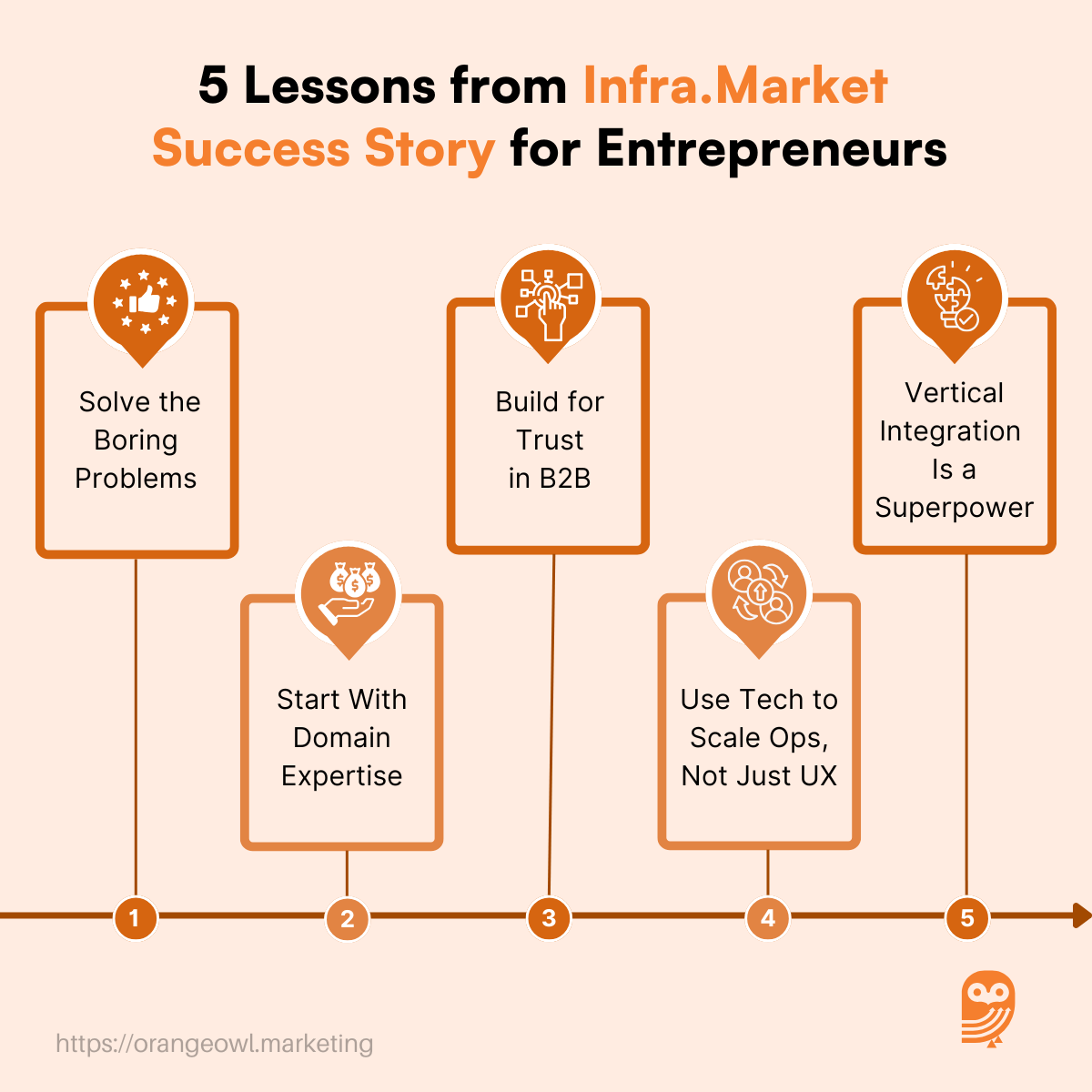Infra.Market Success Story: 5 Strategic Lessons for Every Entrepreneur
Vivek Goel
May 20, 2025

Table of Contents
Introduction: Reinventing India’s Construction Supply Chain
In 2016, Souvik Sengupta and Aaditya Sharda identified a significant inefficiency in India’s construction industry—not in the infrastructure itself, but in the procurement and distribution of materials. Contractors and developers largely depended on an unorganized supply chain riddled with price opacity, inconsistent quality, and delayed deliveries. Recognizing this gap, the duo launched Infra.Market, a B2B marketplace aimed at digitizing the procurement of construction materials.
What began as a lean operation has evolved into a tech-enabled construction ecosystem. As of August 2021, Infra.Market achieved a valuation of $2.5 billion, following a $125 million Series D funding round led by Tiger Global Management. This funding round also saw participation from existing investors such as Accel, Nexus Venture Partners, Evolvence India Fund, Sistema Asia Fund, and Foundamental Gmbh .
Infra.Market’s reach has expanded significantly, supplying products across 20 Indian states and exporting to global markets including Dubai, Singapore, and Italy . The company serves over 2,000 clients, encompassing large developers, government contractors, and retail hardware stores. With more than 260 manufacturing units, over 200 of which focus on concrete production, Infra.Market has established a robust infrastructure to meet the diverse needs of the construction industry .
“India’s infrastructure sector was growing, but the supply side was broken. We knew if we fixed this backend mess, we could build something massive.” — Souvik Sengupta, Co-founder & CEO, Infra.Market
Origin Story: From Family Business to Tech-Driven Disruption
Infra.Market wasn’t born out of a trendy startup idea—it stemmed from deep domain expertise and firsthand frustration with a broken system. Aaditya Sharda, who grew up in a family-run construction business, and Souvik Sengupta, a civil engineer with stints at reputed firms like Buro Happold, understood the inner workings of India’s construction value chain better than most. While other startups were chasing headlines in proptech or construction analytics, Aaditya and Souvik zoomed in on a dull but mission-critical aspect: material procurement.
They observed that small and mid-sized contractors—who make up the majority of India’s infrastructure builders—often lacked the purchasing power or network to secure high-quality materials at scale. On the flip side, manufacturers and distributors operated with zero visibility on demand forecasts, inefficient warehousing, and unpredictable payment cycles.
So, the co-founders started aggregating demand from contractors, using that scale to negotiate better rates with suppliers, and offering standardized, timely delivery. What made their approach stand out wasn’t just better pricing—but the end-to-end control they offered through technology. From order placement to dispatch tracking to digital invoicing, Infra.Market brought transparency and predictability to a sector plagued by informality and fragmentation.
“Everyone talks about real estate and infra growth, but nobody was solving for the building blocks—cement, concrete, steel. That’s what we picked.” — Aaditya Sharda, Co-founder, Infra.Market
Business Landscape and Challenges
The Indian construction supply chain was deeply entrenched in legacy practices when Infra.Market entered the scene. Most purchases happened through verbal negotiations. Payments were delayed. Deliveries were tracked via phone calls. And quality often varied—even within a single shipment. In such an environment, asking stakeholders to move to a digital B2B platform required more than a sales pitch—it demanded a complete behavior change.
Buyers were skeptical. Suppliers were wary of sharing price data. And middlemen—who had long profited from the opacity—resisted the shift. Infra.Market’s team had to invest significant time in relationship-building, conducting demos, and offering hyper-personalized onboarding to bring early users onto the platform.
Moreover, the operational complexity was immense. The company had to manage:
- Logistics and warehousing across multiple product categories like concrete, steel, tiles, and plumbing.
- Vendor quality audits to ensure consistency in B2B deliveries.
- Credit cycles with small contractors, without impacting cash flow.
- Customized fulfillment for projects with unique material requirements and tight deadlines.
Trust, especially in a commoditized space like construction materials, was the biggest hurdle. A contractor wouldn’t risk project delays or sub-par concrete because a startup claimed to be “tech-enabled.” So, Infra.Market focused on proof of execution. They guaranteed delivery timelines, maintained strict SLAs, and built a reputation for being more reliable than the status quo.
“We weren’t just offering tech—we had to prove we were more reliable, faster, and cheaper than the existing system. That’s how we won our first clients.” — Souvik Sengupta
These early wins helped Infra.Market break into mid-tier construction firms and gradually scale up to large government and private developers. As their footprint grew, so did their credibility—transforming what started as a demand aggregation play into a full-stack supply chain innovation for the construction industry.
Growth Strategies: Operational Mastery Meets Tech Enablement
Infra.Market’s meteoric rise wasn’t accidental—it was a result of sharp execution, domain-first thinking, and a relentless focus on solving fundamental problems. One of their earliest and most effective strategies was demand aggregation.
By pooling together orders from hundreds of small and mid-sized contractors, they gained the leverage to negotiate better rates with manufacturers. This not only allowed them to pass on cost advantages to clients but also helped Infra.Market establish long-term supply partnerships that ensured consistency in product availability and pricing.
As the company scaled, they realized that relying solely on third-party manufacturers limited their control over quality and delivery. To address this, Infra.Market made a strategic move into owning manufacturing facilities, producing high-demand items like ready-mix concrete, wall putty, and fly ash blocks.
This vertical integration gave them a dual advantage—improved margins and greater quality control, both critical in a sector where reliability is often the deciding factor for clients.
Technology played a defining role in Infra.Market’s journey, but not in the way most startups use it. Instead of building tech for the sake of scale, the company focused on solving on-ground pain points through automation. Their backend systems handled everything from procurement workflows and inventory tracking to logistics scheduling and real-time quality monitoring.
The client-facing dashboards became a powerful differentiator, offering transparency into order statuses, expected delivery times, and billing history—features that traditional suppliers simply didn’t offer.
As Aaditya Sharda aptly put it,
“We didn’t use tech as a buzzword. Every product feature we built was tied to a pain point on the ground.”
To support their expanding operations, Infra.Market invested in a robust pan-India logistics and warehousing network. With hubs across 20+ states, they streamlined inventory storage and last-mile delivery, enabling them to serve both metro and non-metro locations with equal efficiency. This widespread footprint allowed them to cater to government contractors, large developers, and even retail hardware stores in tier-2 and tier-3 cities.
Not limiting themselves to India, the company also began eyeing global opportunities. With operations already underway in Dubai and Singapore, Infra.Market is strategically positioning itself in fast-growing international infrastructure markets. Their global expansion is driven by the same ethos—offering quality, transparency, and speed in markets traditionally dominated by informal networks.
Marketing Strategy: Trust, Credibility, and Value
Unlike many new-age startups, Infra.Market didn’t invest in celebrity endorsements or high-budget media campaigns. Instead, they let execution drive brand growth. In a B2B environment where reputation spreads through results rather than visibility, the company made each successful order a channel for organic marketing. Satisfied clients turned into long-term partners, and word-of-mouth referrals became their biggest growth driver.
As Souvik Sengupta noted,
“In B2B, the best marketing is delivery. Once you solve for pain consistently, the referrals take care of scale.”
Their marketing playbook focuses more on education and credibility than promotion. Through detailed case studies, client testimonials, and insightful blog content, Infra.Market positions itself as a thought leader in the infrastructure space. They don’t just talk about digitizing supply chains—they demonstrate how their tech reduces leakages, shortens delivery times, and boosts transparency.
Participation in industry expos and government vendor networks further enhances their visibility and trustworthiness among key decision-makers. By prioritizing value creation over flash, Infra.Market has built a brand that stands for reliability, scale, and sector-first innovation.
5 Strategic Lessons for Every Entrepreneur
1. Solve the Boring Problems
The startup world often gravitates toward flashy ideas—fintech apps, social platforms, or D2C brands. But Infra.Market proved that true disruption lies in tackling the “boring” problems—the ones that are overlooked because they’re unglamorous. The construction supply chain was riddled with inefficiencies, lack of transparency, and unreliable fulfillment.
It wasn’t a sector that attracted mass attention from VCs or tech founders, but it was massive in scale. By targeting this unorganized, pain-heavy sector, Infra.Market found a goldmine that few others had the courage or patience to address.
2. Start With Domain Expertise
Founders Souvik Sengupta and Aaditya Sharda weren’t outsiders trying to guess the market—they had lived the problems themselves. Aaditya’s background in a family construction business and Souvik’s engineering and project management experience gave them rare insight into what actually needed fixing.
This domain expertise meant they didn’t waste time building solutions that looked good on paper but failed on-site. Instead, their firsthand understanding helped them create a product-market fit from day one. When you know your customer deeply, execution becomes faster, sharper, and more grounded in reality.
3. Build for Trust in B2B
Unlike B2C, where a catchy campaign can drive growth, B2B businesses rely on relationships, reliability, and results. Infra.Market’s brand wasn’t built in billboards or social media—it was built through on-time deliveries, consistent product quality, transparent pricing, and a tech stack that eliminated ambiguity.
They understood that in B2B, trust is the currency, and earning it requires operational discipline. Their growth wasn’t viral—it was earned, one satisfied customer at a time.

4. Use Tech to Scale Ops, Not Just UX
Many startups focus on the frontend experience—pretty dashboards and mobile apps—but ignore the backend where real bottlenecks occur. Infra.Market flipped this script. They invested in technology that automated supply chain operations, procurement workflows, real-time tracking, and quality control.
Their tech wasn’t just for show; it was deeply functional and rooted in everyday operational problems. This approach ensured that as the company scaled, service quality didn’t drop—it improved.
5. Vertical Integration Is a Superpower
When Infra.Market decided to manufacture products like wall putty and ready-mix concrete in-house, it wasn’t just about expanding revenue streams—it was about controlling the core of their offering. By owning parts of the supply chain, they improved quality, reduced dependency on third parties, and enhanced profit margins.
This vertical integration gave them the agility to respond to demand faster and deliver better pricing to clients.
As Aaditya Sharda put it,
“In infra, you can’t scale without owning parts of the supply chain. That’s where real leverage is.”
Conclusion: Infra.Market’s Blueprint for India’s Infra Revolution
Infra.Market’s journey is a powerful reminder that transformational businesses are built by solving deep-rooted inefficiencies in traditional sectors. In a space long dominated by informal practices and legacy players, Infra.Market introduced technology, transparency, and trust. Their rise from a demand aggregator to a $2.5+ billion construction commerce powerhouse showcases how innovation doesn’t always require reinventing the wheel—sometimes, it’s about making the wheel move faster, smoother, and smarter.
With over $900 million in funding from global investors like Tiger Global, Accel, and Nexus Venture Partners, and a footprint expanding into international markets like Dubai and Singapore, Infra.Market is proving that Indian startups can lead infrastructure innovation—not just locally, but globally. They’re not just changing how construction materials are bought—they’re redefining how the entire construction value chain operates.
For aspiring entrepreneurs, the key lesson is this: the next big wave of billion-dollar companies in India won’t just come from consumer apps or digital payments. They’ll emerge from solving messy, operationally complex, and deeply offline challenges—whether in infrastructure, logistics, agriculture, or manufacturing. If you can bring structure to chaos, especially in a country as vast and varied as India, you’re not just scaling a business—you’re shaping the future of an entire industry.
“The next billion-dollar companies in India won’t come from consumer tech—they’ll come from solving supply chain chaos in core sectors.”


